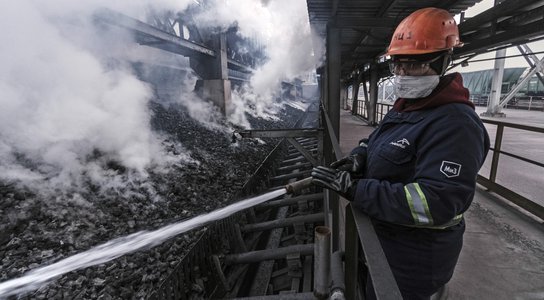When Russia invaded in Ukraine in February, the big oil companies who spent decades building up the Kremlin’s fossil fuel exports were quick to condemn the aggression.
BP’s CEO declared that he was shocked and saddened. Others followed suit. Over the next six weeks, the fossil fuel industry announced that its business as usual in Russia was over. TotalEnergies announced an end to new investments, commodity giants like Vitol announced they would phase out Russian oil, and BP Shell & Exxon promised to exit their enormous investments in the country all together.
Yet as Global Witness investigations have revealed time and time again, many companies were saying one thing, and doing another. The gap between their words and their actions has contributed to the Kremlin’s ability to fund the war in Ukraine.
In April, we demonstrated that in the calendar month following Russia’s invasion of Ukraine, three of the world’s largest commodity traders—Vitol, Trafigura and Glencore—transported more oil from Russian ports than they had done in the same period over at least the last three years. After a wave of coverage, including a front-page story in the Financial Times, Vitol finally committed to an end-date for its trade of Russian oil.
Russian oil continued to flow around the world, funding the Kremlin’s brutal invasion. In May, the European Union finally announced sanctions to ban the import of Russian oil. But after backroom wrangling, a provision which would have prevented European companies from shipping Russian oil around the world was dropped. Our research, published with the Independent showed how Cypriot, Greek and Maltese shipping industries had been moving increasing volumes of Russian oil since the invasion, exposing the interests which had watered down the rules. Raising awareness of the role these three countries play in exporting Russian oil has made it increasingly difficult for them to block measures.
The fossil fuel industry and its enablers have shown that even with strong rules in place, some are prepared to test the line. In the first reported apparent breach of European energy sanctions against Russia, we co-published stories with Die Welt on a shipment of Russian coal by a German shipping firm, which has led federal prosecutors in Lubeck to launch a preliminary investigation.
Even now, European complicity in the Russian fossil fuel industry is not limited simply to the trade of Russian oil. In August, we published an investigation into TotalEnergies’ Siberian gas production at Termokarstovoye, which Total maintained after the invasion on the grounds that it was required for European energy security. Our investigation, co-published with Le Monde, revealed links between that production and Russian military attacks on Ukrainian civilians, which Total later denied.
Following a wave of media coverage, French politicians and a government minister called for official inquiries, and Total updated their response once and a second time in the space of two days as pressure mounted. On August 26, Total finally announced it was selling the Termokarstovoye field and its 49% stake in the associated company, TerNefteGaz. As a result, French MPs tabled an amendment which would have taxed TotalEnergies’ Russian profits at 100% and committed them to the reconstruction of Ukraine, a proposal which narrowly failed by 8 votes.
A coalition of NGOs have filed a criminal complaint against Total for alleged complicity in war crimes based on that investigation. The complaint was filed with the National Anti-Terrorism Prosecutor's Office in Paris and as the Financial Times pointed out, the case will ‘test the legal responsibility of western companies with investments in Russia regarding Moscow’s war against Kyiv’.
Of all the fossil fuel industry’s broken promises on Russia, one looms large. In December, nearly 10 months after BP promised to sell its stake in Rosneft, Putin’s oil company, Global Witness published analysis showing that the British company is owed £580m this year in dividends, blood money made as a result of the war. Our analysis was covered by the BBC and Guardian and resulted in scathing commentary from conservative newspapers like the Telegraph. The story caused outrage among MPs, and former Labour Minister Margaret Hodge tabled a motion condemning BP and secured an urgent question in parliament, where a cross-party group of MPs grilled a Treasury minister and pushed for the government to take action.
Ultimately, the horrors of the war in Ukraine and sustained pressure on the fossil fuel industry has had a significant impact. In October, Reuters reported that Exxon’s oil output from their enormous Sakhalin-I project ‘collapsed’ from mid-May, from around 220,000 barrels per day to just 10,000. This was attributed to Western insurers’ refusal to insure Sovcomflot ships. The first P&I club to stop insuring Sovcomflot ships did so in response to Global Witness research, and a letter from economic advisor to President Zelenskyy Oleg Ustenko in early April.
Russia will never again be a reliable supplier of energy. Oil and gas companies have sought to exploit the war to drag us all backwards, but their complicity in Russia’s aggression has demonstrated the clear link between fossil fuels and violence. The war in Ukraine is a moment when the climate movement must respond, holding up a mirror to a thoroughly broken and abusive global energy system. This war can mark a turning point in the renewable transition, so that no one country can ever hold another hostage and force millions into complicity with atrocities because of a dependence on fossil fuels.


